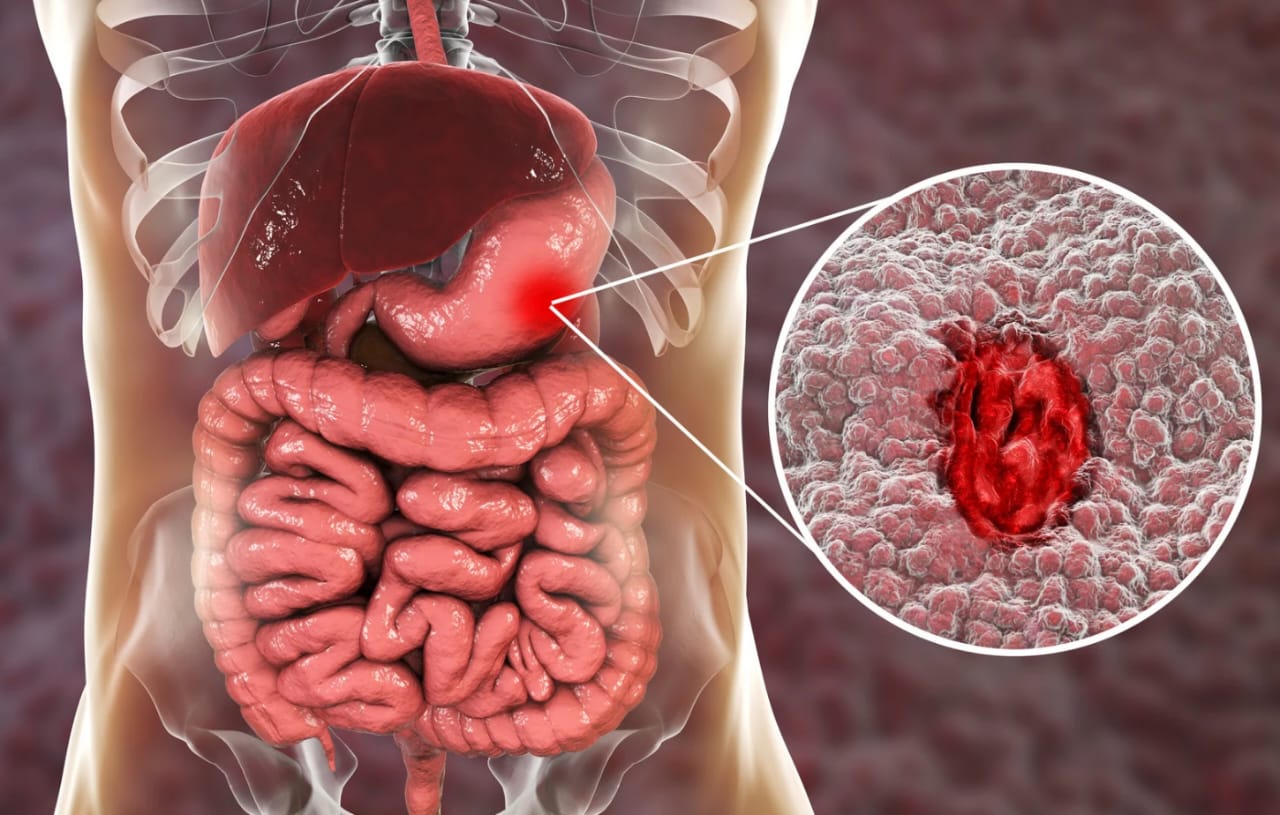Peptic ulcers are painful sores that develop on the inner lining of the stomach, upper small intestine, or esophagus. These ulcers result from damage to the protective mucosal lining due to excessive stomach acid, bacterial infections, or prolonged use of certain medications.
If left untreated, peptic ulcers can cause serious complications like internal bleeding, perforation, or stomach obstruction. Fortunately, effective treatments are available, ranging from medications to dietary adjustments and lifestyle changes. This in-depth guide will help you understand the causes, symptoms, best treatments, and preventative measures for peptic ulcers.
What Are Peptic Ulcers?
Peptic ulcers are open sores that form when gastric acid damages the stomach or duodenal lining. They can occur in three areas:
- Gastric ulcers – Found in the stomach lining.
- Duodenal ulcers – Develop in the small intestine (duodenum).
- Esophageal ulcers – Occur in the esophagus, usually due to acid reflux.
Causes of Peptic Ulcers
Peptic ulcers are primarily caused by an imbalance between digestive juices and the mucosal defense mechanisms. Common causes include:
1. Helicobacter pylori (H. pylori) Infection
- A bacterial infection that weakens the stomach lining.
- Leads to chronic inflammation and ulcer formation.
- Found in over 50% of ulcer cases worldwide.
2. Non-Steroidal Anti-Inflammatory Drugs (NSAIDs)
- Long-term use of NSAIDs (Aspirin, Ibuprofen, Naproxen) can irritate and erode the stomach lining.
- Inhibits prostaglandins, which protect the stomach lining.
3. Excess Stomach Acid Production
- Zollinger-Ellison Syndrome (ZES): A rare condition that causes excessive stomach acid secretion.
- Stress & Diet: Psychological stress and spicy foods do not cause ulcers but can worsen symptoms.
4. Lifestyle Factors
- Smoking & Alcohol: Increase stomach acid and weaken the mucosal barrier.
- Poor Diet: High-fat, processed, and spicy foods can irritate an existing ulcer.
- Frequent Acid Reflux: Can lead to esophageal ulcers.
Symptoms of Peptic Ulcers
The most common symptom is a burning pain in the stomach, but other signs include:
Gastric & Duodenal Ulcer Symptoms:
| Symptom | Description |
| Burning pain in the stomach | Occurs between meals or at night, relieved by eating or antacids. |
| Bloating & Belching | Feeling of fullness, indigestion. |
| Heartburn | Acid reflux, chest discomfort. |
| Nausea or Vomiting | May include vomiting blood (severe cases). |
| Dark or Bloody Stools | Sign of bleeding ulcers, requires immediate medical attention. |
| Unexplained Weight Loss | Chronic ulcers can lead to poor appetite. |
How Are Peptic Ulcers Diagnosed?
A gastroenterologist may perform the following tests to confirm an ulcer:
1. Endoscopy (EGD – Esophagogastroduodenoscopy)
- A small camera is inserted through the throat to visualize ulcers.
- Biopsy may be taken for H. pylori testing.
2. H. pylori Tests
- Urea breath test: Detects H. pylori by analyzing exhaled breath.
- Stool antigen test: Checks for bacterial proteins in stool.
- Blood test: Identifies H. pylori antibodies.
3. Barium Swallow X-ray
- Uses contrast dye to highlight ulcers in an X-ray image.
4. Gastric Acid Secretion Tests
- Checks for excess acid production (Zollinger-Ellison Syndrome).
Best Treatments for Peptic Ulcers
1. Medications for Peptic Ulcers
A. Proton Pump Inhibitors (PPIs) – Reduce Stomach Acid
- Best-selling drugs for ulcers, GERD, and acid reflux.
- Blocks acid production and promotes healing.
- Examples:
- Omeprazole (Prilosec)
- Esomeprazole (Nexium)
- Pantoprazole (Protonix)
B. H2-Receptor Blockers – Reduce Acid Secretion
- Decrease acid production for long-term relief.
- Examples:
- Ranitidine (Zantac) (withdrawn in some countries due to contamination concerns)
- Famotidine (Pepcid)
C. Antibiotics for H. pylori
- A combination therapy is required:
- Clarithromycin + Amoxicillin + PPI
- Metronidazole may be used in penicillin-allergic patients.
- Treatment lasts 7–14 days.
D. Antacids for Immediate Relief
- Neutralize stomach acid, providing temporary symptom relief.
- Best OTC options:
- TUMS (Calcium Carbonate)
- Gaviscon
- Maalox
2. Natural Remedies for Peptic Ulcers
A. Probiotics
- Helps balance gut bacteria and aids in H. pylori eradication.
- Found in yogurt, kefir, fermented foods.
B. Licorice Root
- Helps stimulate mucus production to protect the stomach lining.
- Available in tea or supplement form.
C. Aloe Vera Juice
- Has anti-inflammatory properties that help soothe the stomach.
D. Honey
- Contains antibacterial compounds beneficial for ulcer healing.
3. Lifestyle & Dietary Adjustments
- Avoid NSAIDs – Use Acetaminophen (Tylenol) instead.
- Eat Small, Frequent Meals – Reduces acid exposure.
- Quit Smoking & Limit Alcohol – Promotes healing.
- Reduce Stress – Yoga, meditation, and exercise can help.
Peptic Ulcer Surgery & Advanced Treatments
For complicated ulcers (bleeding, perforation, obstruction), surgery may be required:
1. Endoscopic Therapy
- Cauterization – Stops bleeding ulcers.
- Clip placement – Prevents further damage.
2. Vagotomy (Nerve Cutting Surgery)
- Severs stomach acid-stimulating nerves to reduce acid secretion.
3. Partial Gastrectomy
- Removes part of the stomach if ulcers are severe.
Peptic Ulcer Prevention Tips
- Limit NSAID use – Take with food if needed.
- Maintain a balanced diet – High-fiber foods promote gut health.
- Drink water regularly – Reduces acid irritation.
- Regular checkups if prone to ulcers.
Frequently Asked Questions (FAQs)
Q: What are the best OTC medicines for ulcers?
A: Prilosec, Pepcid, and TUMS offer relief but do not cure ulcers.
Q: Can peptic ulcers heal on their own?
A: Some minor ulcers heal naturally, but untreated ulcers can worsen.
Q: How long does it take to heal a peptic ulcer?
A: With proper treatment, most ulcers heal within 4–8 weeks.
Q: What foods should I avoid with a peptic ulcer?
A: Spicy foods, caffeine, alcohol, acidic foods, and fried items can worsen symptoms.
Conclusion
Peptic ulcers are treatable and preventable with the right medications, diet, and lifestyle changes. Whether you are looking for best ulcer medications online, prescription ulcer treatment, or fast pain relief, understanding your condition is the first step to recovery. Always consult a doctor for proper diagnosis and treatment!



